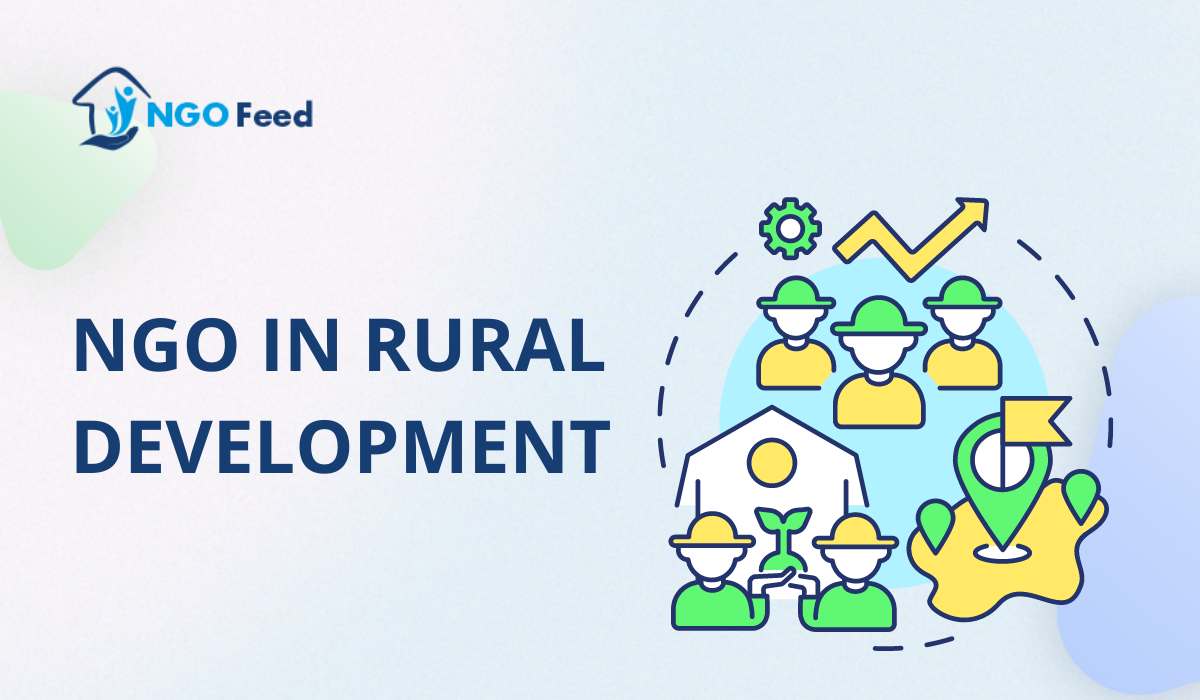NGO in Rural Development: NGOs, universally, have been involved in the community’s uplifting through socio-economic developments in different parts of the world. In rural areas where a resource base and the provision of essential services may be limited, NGOs have emerged as critical champions for change and progress. This blog will give you an understanding of the role of NGOs in rural development, the activities they engage in, and the creative approaches they develop to overcome unique hindrances experienced by rural communities.
Table of Contents
Importance of NGOs in Societal Development
Other than the governments of nations or states, NGOs have become a kind of actors without which positive change and meeting the needs of an underserved community would be challenging. They demonstrate their unique abilities to form strong relationships with utilities, mobilize community support, and engage in the most efficient deployment employing a multi-player approach. This increases their value, and they become an irreplaceable partner in development. In rural communities, which often do not have enough government service structures, NGOs have utilized their resources to help bridge the gap and ensure that essential services and support find their way to the vulnerable.
Overview of the Role of NGOs in Rural Areas
Rural development involves the entire spectrum of activities intended to improve the lives of people who live in rural settings and to revitalize their economies. The organizations of civil society NGOs have been a vital part of this transition process, applying their know-how, resources and social network to solve the diversity of problems in rural areas.
Understanding Rural Development
The term rural development can be explained as the process where the rural population levels are raised through economic development. This refers to efforts that deal with the sector, including agriculture, infrastructure, health, education, and social welfare.
Key Objectives of Rural Development Initiatives
- Enhancing agricultural productivity and sustainability
- Improving access to healthcare and sanitation
- Promoting educational opportunities and literacy
- Developing infrastructure and connectivity
- Fostering economic diversification and entrepreneurship
- Empowering marginalized communities and promoting social inclusion
The Critical Role of NGOs in Rural Development in India
Bridging the Gap Between Government Provisions and Community Needs
As NGOs represent the local needs of a community and the national policies, they act as the middle link between the solutions (government policies) and the problems that people in rural communities are experiencing (real world challenges). Through their collaboration with the populations of local communities, the NGOs can identify the most pressing problems, advocate for community-centred answers, and make certain that the public resources and the efforts of national authorities are aimed at places where they can produce the best effect.
Case Examples of Successful NGO Interventions in Rural Areas
- Enhancing agricultural productivity through the introduction of sustainable farming techniques and modern technologies
- Improving access to healthcare by establishing mobile clinics and telemedicine services
- Boosting literacy rates through the establishment of community-based schools and adult education programs
- Empowering women and promoting gender equality through targeted initiatives
Key Areas of Focus for NGOs in Rural Development
1. Agricultural Support and Sustainability
NGOs perform a very important function of supporting and advancing sustainable farming methods, such as organic farming, crop diversification, and water management strategies. They do training, supply resources, and create market linkages to enhance farmers’ productivity and farm incomes.
2. Healthcare Access and Improvement
In communities where healthcare infrastructure often does not exist, NGOs have sought to give people access to clinics by introducing mobile services, improving sanitation facilities and supporting health education. They seek to promote consideration for the particular needs of healthcare provision in remote locations.
3. Educational Programs and Literacy
NGOs are at the forefront of establishing community-based schools, technical training centres, as well as adult literacy centres in rural areas. To promote quality education, they reach out to rural communities and as a result, they empower them for social and economic development.
Challenges Faced by Rural Communities in India
1. Economic Limitations
In many rural towns, economic constraints present themselves through low access to the market, the lack of job opportunities and basic infrastructure, which often did not meet the demand. Such a situation often means poor living conditions, little work at the disposal of people and a small base for economic growth.
2. Access to Modern Technology and Infrastructure
Internet connectivity, water supply, and other essential amenities are often too minimal for many individuals living in rural areas and strongly depend on the availability of different technologies, transport, and basic infrastructure such as electricity, sanitation and clean water. This increases economic flexibility and also hinders the population’s wealth level.
3. Socio-political Challenges in Rural Regions
The rural areas, however, might have their specific socio-political issues, including shortage of political representation, power struggles, and cultural lag, which may hinder their advancement. These can thus create a barrier that impedes the mobilization of the required resources and the implementation of development projects.
How NGOs Overcome Rural Development Challenges?
1. Mobilizing Resources Effectively
NGOs exploit various funding sources, such as grants, donations and partnerships with government agencies and private organizations, to get the funds needed for integrated rural development programs.
2. Implementing Community-based Strategies
Using a community-based approach and working closely with the local community development programs, NGOs can design and implement development programs that can be adapted to the particular needs and circumstances of rural areas.
3. Partnership Models with Local Governments
The NGO can form strategic partnerships with local administrations and NGOs to harmonize efforts with government policies and to use public resources to increase the impetus given to its rural development endeavours.
Innovative Strategies in Rural Development by NGOs in India
1. Use of Renewable Energy Sources
NGOs increasingly adopt renewable energy solutions, such as solar power and micro-hydropower, to provide clean and sustainable energy access to rural communities.
2. Mobile Health Clinics and Telemedicine
To address the limited healthcare infrastructure in rural areas, NGOs have pioneered mobile health clinics and telemedicine services, bringing essential medical care and expertise to remote communities.
3. E-learning Platforms and Digital Education
To provide access to high-quality education in rural areas where physical infrastructure may be limited, non-governmental organizations (NGOs) are utilizing digital technology to create e-learning platforms and virtual educational programs.
The Economic Impact of NGO Activities in Rural Areas
1. Enhancing Local Economies Through Micro-enterprises
NGOs have been instrumental in fostering entrepreneurship and supporting micro-enterprise development in rural areas, creating sustainable livelihoods and boosting local economic activities.
2. Impact on Employment and Local Industries
By supporting the growth of small-scale industries, agricultural enterprises, and local value chains, NGOs have contributed to creating new job opportunities and strengthening local economies in rural regions.
3. Success Stories of Economic Transformation
The interventions of NGOs have led to remarkable economic transformations in many rural communities, with increased incomes, reduced poverty levels, and the emergence of thriving local economies.
Social Changes Driven by NGOs in Rural Development
1. Improving Gender Equality
NGOs have empowered women, promoted participation in decision-making processes, and addressed gender-based disparities in rural areas.
2. Empowerment of Marginalized Communities
By focusing on the needs of marginalized groups, such as indigenous populations, ethnic minorities, and the rural poor, NGOs have been instrumental in fostering social inclusion and equity.
3. Social Cohesion and Community Building
Through their community-centric approaches, NGOs have strengthened social bonds, enhanced community resilience, and fostered a sense of collective purpose in rural areas.
Environmental Sustainability and Its Role in Rural Development in India
1. Initiatives for Clean Water and Sanitation
NGOs have been at the forefront of addressing the critical issue of access to clean water and improved sanitation facilities in rural communities, promoting public health and environmental well-being.
2. Sustainable Farming and Land-use Practices
By advocating for and implementing sustainable agriculture techniques, NGOs have helped rural communities adopt more environmentally friendly practices, ensuring long-term viability of their land and natural resources.
3. Conservation and Biodiversity Projects
NGOs have been instrumental in launching initiatives to protect local ecosystems, preserve biodiversity, and promote sustainable resource management in rural areas.
The Future of NGOs in Rural Development
1. Emerging Trends and Technologies
As rural development challenges evolve, NGOs are embracing new technologies, such as digital platforms, renewable energy solutions, and data-driven approaches, to enhance the impact and scalability of their initiatives.
2. Challenges for Scalability and Sustainability
While NGOs have achieved remarkable successes, they often face challenges in scaling up their interventions and ensuring the long-term sustainability of their programs. Addressing these hurdles will be crucial for the future of NGOs in rural development.
3. The Evolving Role of NGOs in Global Development Contexts
As the global development landscape shifts, NGOs must adapt and redefine their roles, forging stronger partnerships, diversifying their funding sources, and aligning their efforts with emerging global frameworks and priorities.
Conclusion
The NGOs, on their part, have become the inevitable partners in rural development, filling the gaps between government provisions and ground needs and bringing about positive changes in the lives of the rural communities. NGOs have proved their immense capabilities through innovative strategies and targeted interventions and remain committed. Therefore, NGOs can address the diverse challenges facing communities in rural areas. According to global changes, NGOs in rural development will be more important in future, thus the catalysts of a fairer and more sustainable world.



